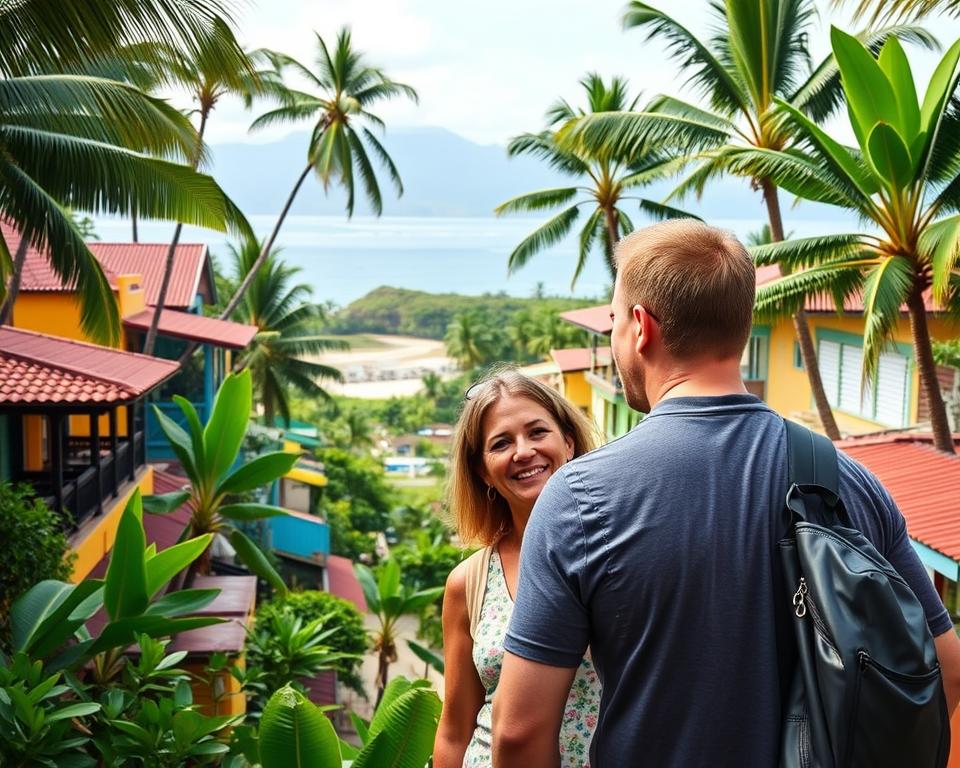Understanding Costa Rica Real Estate Laws: Your Essential Guide
Ever wondered about Costa Rica’s stunning landscapes and growing expat communities? It’s key to know the real estate laws here. This guide will help you understand the legal side of buying property in Costa Rica. It’s designed to prepare you for the journey from curiosity to owning a piece of paradise.
Costa Rica’s real estate laws are welcoming, thanks to its commitment to property rights. But, it’s important to do your homework. This guide will share lots of useful info, from types of land ownership to legal aspects of buying property. Get ready to make smart choices in this beautiful country.
Key Takeaways
- Costa Rica’s property transfer tax is set at 1.5% of the purchase price.
- Property taxes are approximately 0.25% of the property’s value, due annually.
- Closing costs can average around 3.6% of the total sales price.
- Foreigners can only own a maximum of 49% of Maritime Zone land in Costa Rica.
- Deposits for real estate purchases typically cost around 10% of the sale price.
- Checking the Real Estate National Registry is essential for confirming property ownership.
- Understanding the operational readiness for rental properties is crucial for compliance.
A Brief Overview of Costa Rica Real Estate Laws
Costa Rica welcomes real estate investors with open arms. Its laws make it easy for both locals and foreigners to own property. Knowing these laws helps avoid problems when buying property.
The Friendly Legal Framework for Foreign Investors
Costa Rica’s laws support foreign investment in real estate. There are few limits on foreign ownership. This means foreigners can buy property directly or through a company like an S.A.
The Constitutional Right to Property Ownership
The constitution protects property rights for everyone in Costa Rica. This makes it easier for foreign investors to own property. Property owners must pay annual taxes, about 0.25% of the property’s value.
Costa Rica’s focus on legal ownership and property rights draws investors worldwide.
Types of Land Ownership in Costa Rica
It’s important to know about the different types of land ownership in Costa Rica if you’re interested in real estate. Each type has its own features that can affect decisions for both investors and homeowners. The main types are private property, public property, and municipal property.
Private Property
Private property is the simplest form of land ownership. Here, individuals have full rights and control over their land. They have a registered title with the National Registry, proving their legal ownership. Foreigners can also own property, either on their own or through a Costa Rican corporation.
Costa Rica has strict rules to protect both citizens and foreigners. This ensures that everyone’s rights are respected.
Public Property
Public property is owned by the government and can’t be bought or rented by individuals. It’s usually used for public things like parks or government buildings. Knowing this is key for buyers, as it can limit what you can do with the land.
Municipal Property
Municipal property is managed by local governments. It’s used for community needs like schools and libraries. Its use is controlled by local laws and environmental rules. This information helps investors find places that fit with local development plans.
Legal Aspects of Real Estate Transactions in Costa Rica
Understanding the legal side of real estate in Costa Rica is key for everyone. The National Registry keeps property ownership records up to date. This system makes sure all transactions are clear and secure.
Without the right legal papers, buying or selling property in Costa Rica can get tricky.
The Importance of the National Registry
The National Registry is a reliable way to check who owns property in Costa Rica. After a deed is signed, it’s usually registered within two weeks. This makes sure everyone knows who owns what.
It also helps prevent fights over who owns a property. You can check if a property is registered online through the Public Registry website.
Essential Legal Documentation
Having the right legal papers is vital for real estate deals in Costa Rica. You need a purchase-sale agreement and property titles. These papers spell out the deal’s terms and protect both sides.
The due diligence process, lasting 30 to 60 days, checks if everything is legal. You must agree on legal fees before the deal is done.
Costa Rica Real Estate Laws: Due Diligence Process
For those looking to buy property in Costa Rica, knowing the due diligence process is key. This step-by-step guide helps ensure a safe and informed purchase. It helps avoid risks often linked with buying property.
Verifying Property Titles
First, you need to check the property titles in Costa Rica. This step shows who legally owns the property and if there are any debts or restrictions. It’s crucial to avoid future disputes and understand what you’re buying.
Checking Zoning Laws and Restrictions
It’s also important to understand the zoning laws in Costa Rica. These laws control how you can use the property. Buyers should make sure the property’s use fits local laws to avoid legal issues later.
Reviewing Liens or Encumbrances
Looking into any liens or encumbrances on the property is another key step. Unpaid debts can lower the property’s value or make it unusable. Clearing these financial issues helps buyers make better choices.
Experts say doing thorough legal and technical checks is vital. It lets buyers confidently handle the real estate process in Costa Rica. For more help and advice, contact Grupo Gap LLC SRL. They provide expert guidance every step of the way.
Closing and Title Transfer Procedures in Costa Rica
The closing process for real estate in Costa Rica has key steps for a legal transfer. A real estate attorney plays a big role. They make sure everything is done right and the title is recorded correctly.
Facilitating the Closing Process
The closing process includes several stages:
- Consultation with a real estate attorney to review all necessary documentation.
- The preparation of the sales agreement and other essential legal documents.
- Transfer of funds and payment of required taxes.
- Finalization of the sale with the notary to ensure a smooth registration.
The attorney checks the property title and looks for any liens. This helps avoid problems and ensures everything is done right.
Costs and Legal Fees Involved
It’s important to know the costs of closing a real estate deal. Buyers should expect to pay for:
- Real estate legal fees, which can vary based on the complexity of the transaction.
- Transfer tax, amounting to 1.5% of the purchase price, due within 15 business days of the transaction.
- Notary fees, generally ranging from 1% to 2% of the property’s value.
- Registration expenses calculated at approximately 0.8% of the property’s value.
The total cost of a real estate transaction in Costa Rica is about 3.7% of the property’s value. Buyers should plan carefully to avoid penalties. For more information, check out GAP Real Estate.

Special Considerations in Costa Rica’s Real Estate Laws
Buying real estate in Costa Rica means dealing with unique legal rules. These rules affect who can own and use land. The maritime zone law in Costa Rica is key for coastal property deals. It’s important for buyers, mainly those looking at beachfront properties.
The Maritime Zone Law
The maritime zone law in Costa Rica controls land within 200 meters of the high tide line. The first 50 meters are public land. This means you can’t own these areas privately. It’s a big deal for those wanting to buy oceanfront property.
Investors need to understand how this law affects buying coastal land. With its sandy beaches and views, knowing these rules is crucial for a successful investment.
Concession Property Regulations
Concession property rules in Costa Rica deal with leased land for commercial use in coastal areas. These rules let people or companies lease land without owning it. It’s important for foreign investors to know these rules.
Following these regulations ensures you’re doing things right. It also opens up more investment chances. Knowing both the maritime zone law and concession property rules is key for coastal real estate.
Understanding these laws helps buyers make smart choices. It leads to better investment decisions. For more on real estate in Costa Rica, check out this link.
Legal Protection and Dispute Resolution for Investors
Investors in Costa Rica’s real estate market have strong legal protection. This is thanks to the country’s judicial system. Knowing how this system works is key to owning property and investing wisely. It’s also important to understand how to handle disputes that might come up.
Judicial System and Resources for Dispute Resolution
The judicial system in Costa Rica has many resources for solving disputes. It’s important for investors to learn about these options. They help make sure your rights are protected during property deals.
The system offers both formal and informal ways to solve problems. This means you can find a solution that works best for you.
Mediation and Arbitration Procedures
Mediation and arbitration are big parts of solving disputes. They can help avoid long court fights and lead to quicker solutions. It’s smart to include these options in your contracts.
This way, you can manage risks better when buying or selling property. Gap Real Estate can help you understand the Costa Rican market better. Learn more about how open listings can help with your property search and sales.
Conclusion
Understanding Costa Rica’s property laws is key for anyone thinking about buying property there. The country welcomes foreign investors with open arms, giving them the same rights as locals. Buying property, whether for a home or business, is straightforward with the right help.
Knowing about legal documents, property titles, and taxes is important for a smooth deal. This includes property transfer taxes and notary fees. It makes the whole process easier.
For those ready to invest or move, a knowledgeable team can help a lot. Many choose to own property through a corporation, like a Sociedad Anonima (S.A.). This is helpful for beachfront properties and can save on taxes.
Buying or Selling? Call GAP To Get Started Today
GAP Real Estate has 20 years of experience in Costa Rica’s real estate market. They offer personalized support for investors. Whether it’s your first time or you’re growing your portfolio, getting legal advice is crucial. Reach out to start your journey.
Source Links
- https://www.hrgvacations.com/blog/costa-rica-real-estate/guide-buying-property-costa-rica-what-you-need-know
- https://osatropicalproperties.com/blog/the-ultimate-real-estate-sellers-guide-in-costa-rica-from-a-lawyer
- https://www.linkedin.com/pulse/property-ownership-costa-rica-cody-gear-gcxae
- https://www.nikorilifestyles.com/blog/navigating-the-complexities-of-real-estate-ownership-in-costa-rica
- https://www.residecostarica.com/buyers-guide
- https://www.nikorilifestyles.com/blog/understanding-property-laws-and-investment-regulations-in-costa-rica
- https://crie.cr/costa-rica-property-ownership/
- https://costaricachristies.com/blog/things-to-consider-when-buying-land-in-costa-rica
- https://lawyersofcostarica.com/costa-rica-real-estate-law/
- https://www.larepublica.net/noticia/a-practical-guide-for-property-buyers-in-costa-rica
- https://www.langstonrealty.com/posts/what-is-the-standard-process-for-purchasing-property-in-costa-rica
- https://quatro.legal/legal-due-diligence-vs-technical-due-diligence/
- https://landcolaw.com/real-estate/indirect-real-estate-transfer/
- https://quatro.legal/understanding-real-estate-closing-costs-costa-rica-comprehensive-guide/
- https://ticotimes.net/2024/05/13/the-complexities-of-real-estate-ownership-in-costa-rica
- https://www.specialplacesofcostarica.com/blog/top-pitfalls-of-buying-property-in-costa-rica/
- https://planb-cr.com/immigration-to-costa-rica-blog/investing-in-costa-rica-a-practical-guide-for-property-buyers
- https://www.nikorilifestyles.com/blog/how-to-protect-yourself-signing-contracts-in-costa-rica
- https://gmattorneyscr.com/practice-areas/
- https://www.costarica-realestate.com/costa-rica-real-estate-buying-and-selling-guidelines
- https://internationalliving.com/countries/costa-rica/real-estate/
- https://costahomesconnect.com/buying-property-in-costa-rica/




